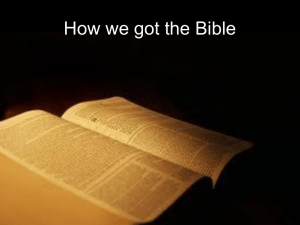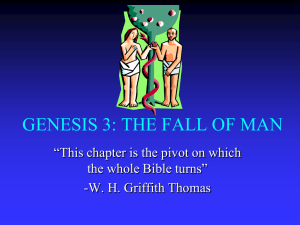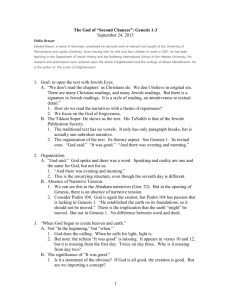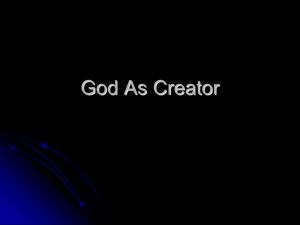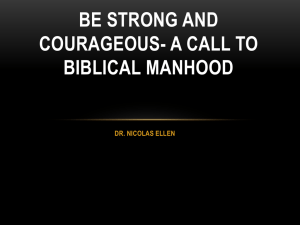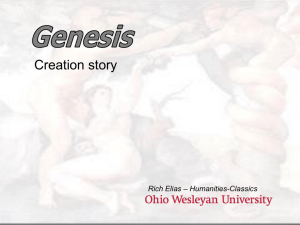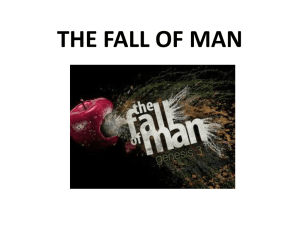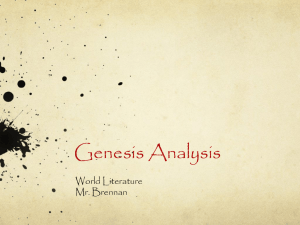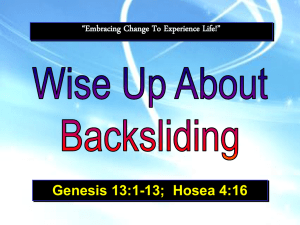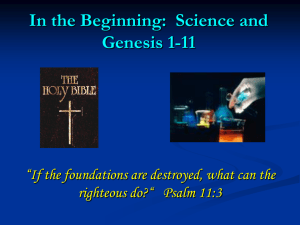HUM 101 Genesis 1-3
advertisement
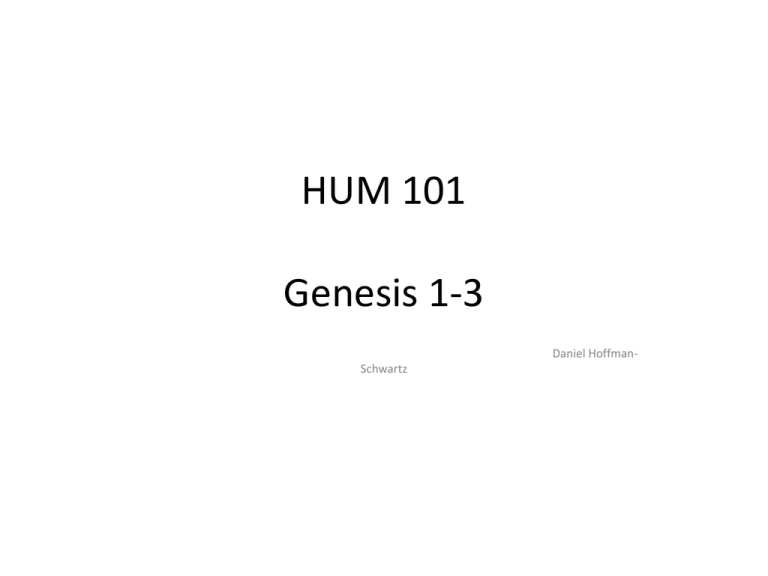
HUM 101 Genesis 1-3 Daniel HoffmanSchwartz “Myth” and “Religion” • In everyday language, “myth” is what belongs to ancient people, ignorant people, or the cultural other, whereas “religion” is what ‘we’ have. • But the two in fact cannot be separated from one another… “Myth” and “Religion” • “Myth,” from Mythos (Greek) – “story, narrative.” • “Religion,” from religio, relegare (Latin) – “to re-bind.” • Religion relies on myths (stories, narratives)… • And myth aims to bind the community together… “Ligament” – Binding, Also from Legare Polytheism and Monotheism • Polytheism = Multiple Gods • Monotheism = One God • Monotheistic “religion” presents polytheism as “myth.” Genesis • Written around 500 BCE • 1st book of the Hebrew Bible and of the Christian Old Testament • Moses traditionally considered author of first 5 books of Hebrew Bible including Genesis • But it is actually a hybrid text, written by different authors, combining different traditions including tradition of Sumerian myth. Transformation of motifs from Epic of Gilgamesh • Coming to consciousness through sexuality. • The experience of limitation. • The serpent and the thorn. Two Creation-Stories: The Problem of Origins • 1. “Let there be a light…” • 2. The Garden of Eden… • Why Two creation-stories? 3 Traits of the Monotheistic God in Genesis 1-2:3 • Sovereignty • Creativity • Transcendence Sovereignty and Creativity • This god rules over the cosmos and gives commands. • This god creates the cosmos by giving commands; e.g., “Let there be light.” • God must be first in time in order to create. And because he is first in time he is first in rank. • However: first in time is not necessarily the first in rank. • This is an invention specific to monotheism. • Compare the Greek Gods: Zeus, the king of the Gods, is of the 4th generation of gods. Genealogy of the Olympians in Greek Mythology Commandment: Separation • “God saw that the light was good and he separated the light from the darkness.” (Genesis, 1:4) • “So God made the vault and separated the water under the vault from the water above it.” (Genesis, 1:6) • “Then God said, ‘Let the land produce vegetation: seed-bearing plants and trees on the land that bear fruit with seed in it according to their various kinds.’” Order • On one hand, man is part of created, natural order, at the top of the hierarchy of created beings. • In other words, social relations are naturalized. • On the other hand, as we see in Garden of Eden story, man cannot simply live within nature, natural order. Transcendence • God is no longer ‘in the world.’ • The Creator cannot participate in the creation – the idea of “first cause.” • Sovereign dignity requires distance. Transcendence • Acts of God ‘in the world’ are henceforth understood as miracles or exceptions • And usually understood as indirect or mediated, that is, as revelations requiring interpretation. Longinus (1st Century C.E.) • “It seems to me that the strange medley of wounds, quarrels, revenges, tears, bonds, and other woes which makes up the Homeric tradition of the gods was designed by its author to degrade his deities, as far as possible, into men[.]” • Genesis 1:3 (“Let there be light”) according to Longinus: an “adequate conception of the supreme being” given “adequate expression.” Freedom as Sovereignty • The creation is a free, sovereign act; it does not have to take place. • And man is free because he is in image of God. • “Then God said, ‘let us make human beings in our image, in our likeness, so that they may rule over the fish in the sea and the birds in the sky, over the livestock and all the wild animals, and over all the creatures the move along the ground.” (Genesis, 1: 26) Freedom as Sovereignty • Man rules on earth because God is not ‘in the world’; man rules for God, in the place of God. • Animals exist to be ruled; power is associated with verticality: “human beings…may rule…over all the creatures that move along the ground.” (Genesis, 1:26) Freedom as Sovereignty • Thus man is both ruling and ruled; ruled by God, but rules over the animals. • How does this work? • This problem is alluded to at Genesis 1:27: “So God created human beings in his own image, in the image of God he created them.” Freedom and Sovereignty • “God created human beings in his own image” – God rules over man – but “in the image of God he created them” – man nonetheless has a God-like freedom. Differences between the Two Creation Stories • Setting: Cosmos versus Earth/Garden • Method: Creation out of nothing [Creatio ex nihilo] versus earth-sculpture+breath of god. • Man’s Place in Sequence: After animals and vegetation versus before animals and vegetation. • The name of God: “God” versus “The Lord God” (or “The God Yaweh”). Giovanni di Paolo, The Creation of the World and the Expulsion from Paradise (1445) Another Mode of Hierarchy: Gender • “The LORD God said, ‘It is not good for the man to be alone. I will make a helper suitable for him.’” • “But for Adam no suitable helper was found. So the LORD God caused the man to fall into a deep sleep; and while he was sleeping, he took one of the man’s ribs and then closed up the place with flesh. Then the LORD God made a woman from the rib he had taken out of the man, and he brought her to the man.” Albrecht Dürer, Adam and Eve (1504) Paul Klee, Adam and Little Eve (1921) Paradoxes of Freedom and Command • “And the LORD God commanded the man, ‘you are free to eat from any tree in the garden; but you must not eat from the tree of knowledge of good and evil, for when you eat of it you will certainly die.” (Genesis 2:16-17) Paradoxes of Freedom and Command • “And the LORD God commanded…‘you are free…but you must not….” • Is this a contradiction? If man is “free,” why is a there “must not”? Paradoxes of Freedom and Command • Because, paradoxically: Only a free being can meaningfully follow a command. • If a being were not free, how could it choose to follow a command? Two Kinds of Freedom • Freedom as sovereignty, the power to command – ‘God’s freedom.’ • Freedom as free will, the power to obey or disobey the law – ‘human freedom,’ ‘ethical freedom.’ Paradoxes of Freedom and Command • Note: in this 2nd creation-story, the status of command has changed: • In the 1st creation-story, commands simply produce reality, • But in the 2nd, the command is not creative, but simply linguistic; there is thus the possibility of the command not being followed. The Problem of the Serpent • Why is the serpent “more crafty than any of old the wild animals the LORD God had made?” • Is there already evil before the Fall? • Has God created an evil being? The Problem of the Serpent • [The serpent] said to the woman, “Did God really say, ‘You must not eat from any tree in the garden’?” • In other words: what if we don’t understand the law? • Or put slightly differently: because the command is now communicative rather than creative or absolute, it is open to interpretation, misunderstanding, translation, etc. Gender Hierarchy II • “I will make your pains in childbearing very severe; with pain you will give birth to children. Your desire will be for your husband, and he will rule over you.” • Tendency to identify Eve with serpent and both with “evil” Entrance to Notre Dame Cathedral (Paris) A 3rd Kind of Freedom? • 1. Sovereign creativity of God; absolute freedom. • 2. Human freedom to follow or not follow God’s commands; free will. • 3. Meaning is never complete, absolute, or final; the authority of the command is not absolute; freedom of language.

